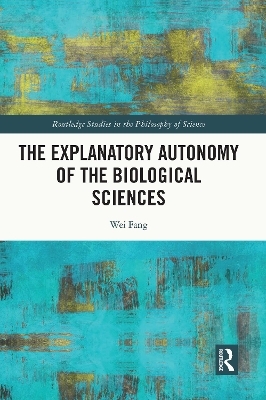
The Explanatory Autonomy of the Biological Sciences
Seiten
2021
Routledge (Verlag)
978-0-367-69351-0 (ISBN)
Routledge (Verlag)
978-0-367-69351-0 (ISBN)
This book argues for the explanatory autonomy of the biological sciences. It does so by showing that scientific explanations in the biological sciences cannot be reduced to explanations in the fundamental sciences, and by demonstrating that biological explanations are advanced by models rather than laws of nature.
This book argues for the explanatory autonomy of the biological sciences. It does so by showing that scientific explanations in the biological sciences cannot be reduced to explanations in the fundamental sciences such as physics and chemistry and by demonstrating that biological explanations are advanced by models rather than laws of nature.
To maintain the explanatory autonomy of the biological sciences, the author argues against explanatory reductionism and shows that explanation in the biological sciences can be achieved without reduction. Then, he demonstrates that the biological sciences do not have laws of nature. Instead of laws, he suggests that biological models usually do the explanatory work. To understand how a biological model can explain phenomena in the world, the author proposes an inferential account of model explanation. The basic idea of this account is that, for a model to be explanatory, it must answer two kinds of questions: counterfactual-dependence questions that concern the model itself and hypothetical questions that concern the relationship between the model and its target system. The reason a biological model can answer these two kinds of questions is due to the fact that a model is a structure, and the holistic relationship between the model and its target warrants the hypothetical inference from the model to its target and thus helps to answer the second kind of question.
The Explanatory Autonomy of the Biological Sciences will be of interest to researchers and advanced students working in philosophy of science, philosophy of biology and metaphysics.
This book argues for the explanatory autonomy of the biological sciences. It does so by showing that scientific explanations in the biological sciences cannot be reduced to explanations in the fundamental sciences such as physics and chemistry and by demonstrating that biological explanations are advanced by models rather than laws of nature.
To maintain the explanatory autonomy of the biological sciences, the author argues against explanatory reductionism and shows that explanation in the biological sciences can be achieved without reduction. Then, he demonstrates that the biological sciences do not have laws of nature. Instead of laws, he suggests that biological models usually do the explanatory work. To understand how a biological model can explain phenomena in the world, the author proposes an inferential account of model explanation. The basic idea of this account is that, for a model to be explanatory, it must answer two kinds of questions: counterfactual-dependence questions that concern the model itself and hypothetical questions that concern the relationship between the model and its target system. The reason a biological model can answer these two kinds of questions is due to the fact that a model is a structure, and the holistic relationship between the model and its target warrants the hypothetical inference from the model to its target and thus helps to answer the second kind of question.
The Explanatory Autonomy of the Biological Sciences will be of interest to researchers and advanced students working in philosophy of science, philosophy of biology and metaphysics.
Wei Fang is Associate Professor in the Research Centre for Philosophy of Science and Technology, Shanxi University, China. His research topics include scientific explanation, models and modeling, causal modeling, mechanisms, among others, and has published a number of papers in, among others, Philosophy of Science, Biology & Philosophy, and Synthese.
1. Introduction
2. Multiple Realization and Reductionism
3. Explanation in Biology: Context Dependence, Extra Information, and Pragmatics
4. Are Laws the Only Things That Matter?
5. Models That Matter: The Similarity View
6. A Holistic View of the Model-World Relationship
7. How Biological Models are Explanatory
8. Conclusion
| Erscheinungsdatum | 29.12.2021 |
|---|---|
| Reihe/Serie | Routledge Studies in the Philosophy of Science |
| Zusatzinfo | 16 Line drawings, black and white; 16 Illustrations, black and white |
| Verlagsort | London |
| Sprache | englisch |
| Maße | 152 x 229 mm |
| Gewicht | 453 g |
| Themenwelt | Geisteswissenschaften ► Philosophie ► Metaphysik / Ontologie |
| Naturwissenschaften ► Biologie | |
| ISBN-10 | 0-367-69351-8 / 0367693518 |
| ISBN-13 | 978-0-367-69351-0 / 9780367693510 |
| Zustand | Neuware |
| Haben Sie eine Frage zum Produkt? |
Mehr entdecken
aus dem Bereich
aus dem Bereich
Buch | Hardcover (2024)
Matthes & Seitz (Verlag)
28,00 €
Über konstruktivistisches Denken in der Theologie
Buch | Softcover (2024)
Verlag Herder
58,00 €


